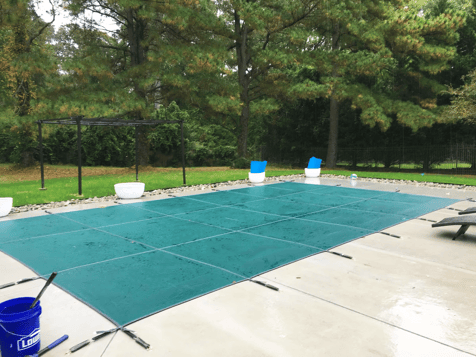The joys of summer: pools and convertibles. My best friend has a red Mustang convertible named Sally (i.e., Mustang Sally). In the summer we love to drive with the top down to get Slurpees. However, with a heavy heart, she has to cover Sally up for the winter. Likewise, you should bundle up your pool during the chilly months. We know it’s a sad day. We won’t judge if you cry a little.
Over the winter, my friend made sure Sally had at least half a tank of gas so the fuel lines wouldn’t freeze. That was about the extent of the winter maintenance for the convertible.
So what winter maintenance does your pool need, if any?
While you may not be as intense about pool care after you winterize your pool, we recommend you maintain these areas:
- The pool cover
- The water level
- The water chemistry
When should I close my pool for the winter?
First of all, you need to know whether you’ll close your pool at all.
There are pros and cons to leaving your pool open all year round.
For those of us who (to our despair) experience cold winters, most pools are open from Memorial Day to Labor Day (May–September). Even if you like to push the limits, you need to close your pool before the temperatures fall under 30°F at night.
If you have a robotic pool cleaner, follow the manufacturer’s instructions for the “remove from pool” temperature so that you don’t damage your poor, dear robot. This will probably be sooner than the overall “close the pool” temperature.
Be sure to avoid the 5 most common mistakes when you winterize your pool.
Should I do maintenance in the winter?
Some people like to hand-hold their pool during the off-season. Others like to let it do its own thing.
Whether you tend to be more autocratic or laissez-faire about your pretty, pretty pool, you should keep these maintenance tips in mind.
Maintain your pool cover
Obviously we’re assuming here that you have a pool cover.

It’s fine if you decide late that you do in fact want one. You can install a pool cover anytime during the year. Even if you get it late, having a cover will help reduce the required maintenance in the spring when you reopen the pool.
Rain and snow
If you’re about to get lots of snow, you can open your pool cover (unless you have an automatic cover system!). Most pool covers aren’t built to withstand heavy weight, including automatic covers, but you could risk damaging the tracks and other parts of the system if you try to operate an automatic cover in freezing weather.
Pump water off solid covers as well, for two reasons:
- Many covers will collapse if too much water collects.
- If you do leave the water there all winter, then what? You open the pool cover in the spring. What happens to the dirty water and whatever debris has collected in it? It dumps right into the pool and negates the benefits of the cover in the first place.
Warm weather
You know the one day in winter when the temperature jumps up thirty degrees and you finally feel alive again? It’s amazing. But not for your pool.
Algae flourishes in the warmth and the dark. If the temperature rises, open your pool cover.
Maintain your pool’s water level
Experiencing precipitation? Worry not. You already blew out and plugged the plumbing lines when you winterized the pool. The water can’t get in the pump/filter system.
What if the water level rises?
A few inches of extra water won’t hurt anything. However, if you’re truly concerned, now is not the time to take matters into your own hands.
Never drain your own pool without professional help. You could damage it and even void your warranty. Get a professional opinion, and have them do it if they agree it’s necessary.
Maintain your pool’s water chemistry
Your pool chemistry should remain in the ideal range as much as you can manage.
To give yourself a head start in the spring, you can test your water weekly in the winter.
If there’s no circulation in the water, you probably won’t need to add any chlorine. It can wait til spring when you turn your pool back on.
Want more info about pools?
All year round, River Pools manufactures and installs fiberglass pools in Virginia and Maryland. We also operate in other areas of the country through our nationwide dealers.
If you’d like to learn more about the different types of inground pools, check out our comprehensive ebook below. It discusses cost, design, durability, installation… basically any aspect you’ll want to compare if you're making a big pool decision.
You can also check out all our blog articles about maintenance for any other issues you may encounter. We want to help you make the most of your pool!

Up Next:
Automatic Pool Cover Winter Maintenance: Everything You Should Know
Fiberglass Swimming Pools 101: Manufacturing, Cost, and More
Editor's note: This blog article was updated on October 17, 2018.



